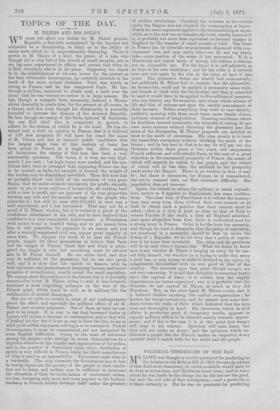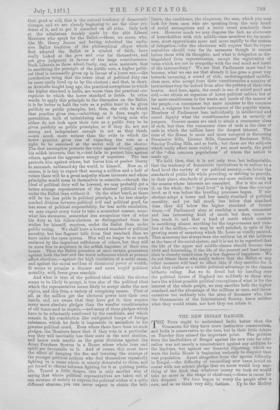POLITICAL TENDENCIES OF THE DAY.
AfR. LOWE was thought a terrible pessimist for predicting in, 1 the debates on the Reform Bill of 1866 the speedy advent of that dead-level democracy, in which molehills would have to do duty as mountains, and thistles as forest trees ; and to soma extent he was liable to the charge, for he did not see the good, but only the evil side of that anticipation,—and a good side to it there certainly is. But he was no pessimist for predicting that, good or evil; that is the natural tendency of democratic changes, and we are already beginning to see the clear evi- dence of it, and to get it conceded on all sides. Only look at the admissions frankly made by the able Liberal Members who speak for the Ballot,—those, we mean, who, like Mr. Henry James, not having inherited the exclu- sive Ballot tradition of the philosophical clique which first adopted the Ballot as a symbol of faith, have really looked at the pros and cons for themselves, and yet give judgment in favour of the largo constituencies. Such Liberals as these admit freely, nay, even maintain, that in sacrificing the principle of the public vote, a higher politi- cal ideal is necessarily given up in favour of a lower one,—the justification being that the lower ideal of political duty can be more easily lived up to by the electors ; and that, in short, as Aristotle taught long ago, the practical corruptions to which the higher standard is liable, are worse than the practical cor- ruptions to which the lower standard is liable. In other words, to apply this principle to the discussion on the Ballot, it is far better to hold the vote as a public trust to be given publicly on public principles, but, then, the evils to which that practice gives rise,—admitting, as it does, ample op- portunities, both of intimidating and of bribing men who either do not look upon their vote as a public duty to be given publicly on public principles, or if they do, are not strong and independent enough to act as they think, —are much more serious than the evils to which the lower practice gives rise of regarding the vote as a right to be exercised at the secret will of the elector. The first assumption protects the voter against himself, against his selfish interests, that is,—but fails to protect him against others, against the aggressive energy of superiors. The last protects him against others, but leaves him at perfect liberty to succumb, unblamed Jay the world, to himself. Now as, of course, it is fair to expect that among a million and a half of voters there will be a great majority whose interests and whose principles would seem to themselves to coincide,—though the ideal of political duty will be lowered, we may probably get a better average representation of the electors' political views under the Ballot than without it. On the other hand, as there will be far less pride in political principle, a far less clearly- marked division between political evil and political good, far less sense of political responsibility, far less noble emulation, we may expect every voter to take a somewhat coarser, some- what less strenuous, somewhat less scrupulous view of what his duty to his fellow-electors, as distinguished from his wishes for himself, requires, under the Ballot than under public voting. We shall have a lowered standard of political morality, but less flagrant falls from that standard than we have under the open system. Men will no longer be so much enslaved by the imperious selfishness of others, but they will be more free to acquiesce in the selfish impulses of their own hearts. Thus the Ballot promises at once certain guarantees against both the best and the worst influences which at present affect elections,—against the high emulation of a noble cause, and against the moral serfdom of dictatorial power or wealth. It seems to promise a dimmer and more torpid political morality, with fewer gross scandals. And what is true of the political ideal which the elector seems to be likely to accept, is true also of the political ideal which the representative seems likely to accept under the new regime, and this from a variety of conspiring causes. First of all, as the million get the electoral power into their own hands, and are aware that they have got it, they require many more absolute pledges than the smaller constituencies of old times used to require,—and many of them pledges which have to be reluctantly swallowed by the candidate, and which remain in his constitution like undigested lumps of foreign substance, which he finds it impossible to assimilate to his genuine political creed. Even where there have been no such pledges, the Members know that if they vote in a particular way they will inevitably lose their seats at the next election, and hence such results as the great divisions against the Army Purchase System in a House whose whole tone and spirit are favourable to it. And of course, this must have the effect of damping the fire and lowering the courage of the younger political soldiers who find themselves repeatedly fighting in a cause which is utterly distasteful to them, and yet forced to choose between fighting for it or quitting public life. Traced a little deeper, this is only another way of saying that where political representatives are taken out of one stratum of society to express the political wishes of a quite different stratum, you can never expect to obtain the bril-
liance, the confidence, the eloquence, the ease, which you may look for from men who are speaking from the very heart of social assumptions and a social creed absolutely their own. However much we may disguise the fact, an electorate of householders with rich middle-class members for its nomi- nees, must approximate more and more rapidly to the system of delegation,—for the electorate will require that its repre- sentatives should vote for its measures though it cannot imbue them with its thoughts; and what is delegation as dis- tinguished from representation, except the registration of votes which are not in sympathy with the real mind and heart of the intermediary ? We see that Parliament must tend to become, what we can see that already it has gone a great way towards becoming, a crowd of rich, undistinguished middle- class men, who accept from their constituencies a number of instructions very far indeed from after the pattern of their own hearts. And here, again, the result is one of mixed good and evil,—we obtain an organism of lower political calibre, but of far more sensitiveness to the wants and needs of the masses of the people,—a commoner but surer minister to the common weal, a vulgarer but broader instrument of the popular wants. Members of Parliament lose, individually, in intellectual and moral dignity what the constituencies gain in security of purpose. Coarser means are used to attain a commoner class of ends, but then the commoner class of ends is the class of ends in which the million have the deepest interest. The time of the House is more and more occupied in discussing Permissive Bills, Licence Bills, Commons' Enclosure Bills, Sunday Trading Bills, and so forth ; but these are the subjects which really affect most visibly, if not most nearly, the good of the " dim common populations " of whom the nation is made up.
We hold, then, that it is not only true, but indisputable, that the tendency of democratic institutions is to reduce to a dead level the variety of our political scenery,—to lower the standards of public life while providing, or striving to provide, in their place, standards of greater and more uniform worth to the masses whose interests are consulted. Nor is this an evil if, on the whole, the " dead level " is higher than the average level, as it was before the levelling processes began. If our electors adopt a lower and loss manly standard of political morality, and yet fall much less below that standard than they did below the higher standard of former times,—if Parliament aims at reaching a much commoner and less interesting kind of merit, but does, more or less, reach it, and that a kind of merit which consists in sacrificing almost anything for the improvement and com- fort of the million,—we may be well satisfied, in spite of the growing sense of monotony which Mr. Lowe so vividly painted. That monotony has always been the uniform lot of the millions at the base of the social system, and it is not to be regretted that the life of the upper and middle-classes should become less vivid and interesting, if the life of the poorest and least happy class is thereby raised even by a few degrees of happiness. We do not blame those who really believe that the Ballot or any other measure will tend to effect this, if they sacrifice for it what they realize as a visible political advantage to the classes hitherto ruling. But we do dread lest by handing over the political future of England too suddenly to those who have the wildest possible political conceptions of what is for the interest of the whole people, we may sacrifice both the higher standard, and the advantage of the millions at once, and throw ourselves too suddenly into the arms of dreamers who, like the Communists of the International Society, know neither what they would attain, nor how they can attain it.



































 Previous page
Previous page